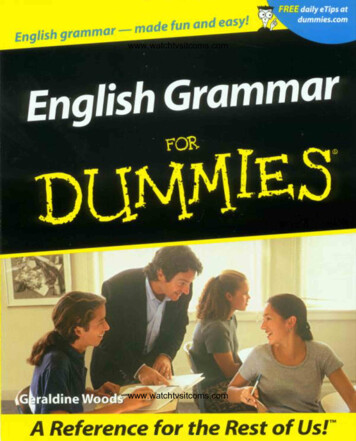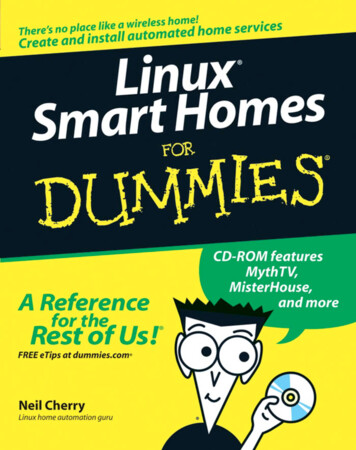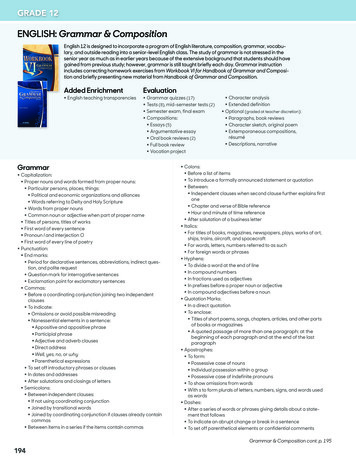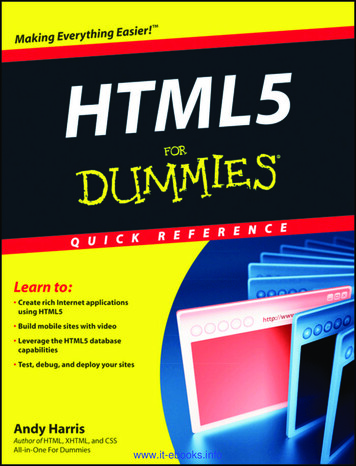
Transcription
www.watchtvsitcoms.comwww.watchtvsitcoms.com
www.watchtvsitcoms.comwww.watchtvsitcoms.com
English GrammarFar dummies www.watchtvsitcoms.comO*A &Parts of Speechi Noun: names a person, place, thing, idea (Lulu, jail, cantaloupe, loyalty, and so on)WPronoun: takes the place of a noun (he, who, I, what, and so on)u* Verb: expresses action or being (scrambled, was, should win, and so on)v* Adjective: describes a noun or pronoun (messy, strange, alien, and so on)A Adverb: describes a verb, adjective, or other adverb (willingly, woefully, very, and so on)u* Preposition: relates a noun or a pronoun to another word in the sentence (by, for, from, and so on)i Conjunction: ties two words or groups of words together (and, after, although, and so on)i Interjection: expresses strong emotion (yikesi wow! ouch! and so on)Parts of a SentencefVerb (also called the predicate): expresses the action or state of beingt Subject: the person or thing being talked aboutu* Complement: a word or group of words that completes the meaning of the subject-verb pairi Types of complements: direct and indirect objects, subject complement, objective complementPronouns TipsPronouns that may be used only as subjects or subject complements: I, he, she, we, they, who,whoever.Pronouns that may be used only as objects or objective complements: me, him, her, us, them, whom,whomever.Common pronouns that may be used as either subjects or objects: you, it, everyone, anyone, no one,someone, mine, ours, yours, theirs, either, neither, each, everybody, anybody, nobody, somebody,everything, anything, nothing, something, any, none, some, which, what, that.Pronouns that show possession: my, mine, your, yours, his, her, hers, its, our, ours, their, theirs, whose.www.watchtvsitcoms.comFor Dummies: Bestsellinq Book Series for Beginners
English GrammarFar ùummtes www.watchtvsitcoms.comSubject-Verb Agreement TipsWMatch singular subjects with singular verbs, plural subjects with plural verbs.i* Amounts of time and money are usually singular (ten dollars is).v* Either/or and neither/nor: Match the verb to the closest subject (neither the boys nor the girl is).v0 Either and neither, without their partners orand nor, always take a singular verb (either of theapples is).v* All subjects preceded by each and everytake a singular verb.k* Both, few, several, many are always plural.Punctuation Tipsu* Endmarks: All sentences need an endmark: a period, question mark, exclamation point, orellipsis. Never put two endmarks at the end of the same sentence.VApostrophes: For singular ownership generally add s;for plural ownership generally add s'.J Commas: In direct address use commas to separate the name from the rest of the sentence. Inlists place commas between items in a list, but not before the first item. Before conjunctions,when combining two complete sentences with a conjunction, place a comma before the conjunction. If you have one subject and two verbs, don't put a comma before the conjunction.-! Verb Tense Tipsu* Simple present tense: tells what is happening now Simple past tense: tells what happened before nowi* Simple future: talks about what has not happened yetJ Present perfect tense: expresses an action or state of being in the present that has someconnection with the pastv* Past perfect tense: places an event before another event in the pastWFuture perfect tense: talks about something that has not happened yet in relation to anotherevent in the futureCopyright 2001 Hungry Minds, Inc.All rights reserved.Cheat Sheet 2.95 value. Item 5322-4.H u n g r y Minds'" por m o r e information about Hungry Minds,www.watchtvsitcoms.comcall 1-800-762-2974.For Dummies: Bestsetting Book Series for Beginners%E-a 2 2
TMwww.watchtvsitcoms.comReferences fat theRest of UstBESTSELLINGBOOK SERIESDo you find that traditional reference books are overloaded withtechnical details and advice you'll never use? Do you postponeimportant life decisions because you just don't want to deal withthem? Then our For Dummies business and general referencebook series is for you.For Dummies business and general reference books are written for those frustrated and hardworking souls who know they aren't dumb, but find that the myriad of personal and business issuesand the accompanying horror stories make them feel helpless. For Dummies books use a lightheartedapproach, a down-to-earth style, and even cartoons and humorous icons to dispel fears and buildconfidence. Lighthearted but not lightweight these books are perfect survival guides to solve youreveryday personal and business problems."More than a publishing phenomenon,'Dummies'is a sign of the times. "— The New York Times"A world of detailed and authoritativeinformation is packed into them. "". .you won't go wrong buying them. "— Walter Mossberg, Wall Street Journal,on For Dummies books— U.S. News and World ReportAlready, millions of satisfied readers agree. Theyhave made For Dummies the #1 introductory levelcomputer book series and a best-selling businessbook series. They have written asking for more.So, if you're looking for the best and easiest wayto learn about business and other generalreference topics, look to For Dummies to give youa helping hand.www.watchtvsitcoms.com5/09Wiley Publishing, Inc.
www.watchtvsitcoms.comwww.watchtvsitcoms.com
www.watchtvsitcoms.comEnglish GrammarFORby Géraldine WoodsWiley Publishing, Inc.www.watchtvsitcoms.com
www.watchtvsitcoms.comEnglish Grammar For Dummies Published byWiley Publishing, Inc.909 Third AvenueNew York, NY 10022www.wi1ey.comCopyright 2001 by Wiley Publishing, Inc., Indianapolis, IndianaPublished simultaneously in CanadaNo part of this publication may be reproduced, stored in a retrieval system, or transmitted in any form or by any means,electronic, mechanical, photocopying, recording, scanning, or otherwise, except as permitted under Sections 107 or 108of the 1976 United States Copyright Act, without either the prior written permission of the Publisher, or authorizationthrough payment of the appropriate per-copy fee to the Copyright Clearance Center, 222 Rosewood Drive, Danvers, MA01923, 978-750-8400, fax 978-646-8700. Requests to the Publisher for permission should be addressed to the LegalDepartment, Wiley Publishing, Inc., 10475 Crosspoint Blvd., Indianapolis, IN 46256, 317-572-3447, fax 317-572-4447, ore-mail permcoordi nator@wi 1 ey . comTrademarks: Wiley, the Wiley Publishing logo, For Dummies, the Dummies Man logo, A Reference for the Rest of Us!, TheDummies Way, Dummies Daily, The Fun and Easy way, Dummies.com and related trade dress are trademarks or registeredtrademarks of Wiley Publishing, Inc., in the United States and other countries, and may not be used without written permission. All other trademarks are the property of their respective owners. Wiley Publishing, Inc., is not associated withany product or vendor mentioned in this book.1 LIMIT OF LIABILITY/DISCLAIMER OF WARRANTY: WHILE THE PUBLISHER AND AUTHOR HAVE USED THEIR BEST IEFFORTS IN PREPARING THIS BOOK, THEY MAKE NO REPRESENTATIONS OR WARRANTIES WITH RESPECT TO THEACCURACY OR COMPLETENESS OF THE CONTENTS OF THIS BOOK AND SPECIFICALLY DISCLAIM ANY IMPLIEDWARRANTIES OF MERCHANTABILITY OR FITNESS FOR A PARTICULAR PURPOSE. NO WARRANTY MAY BE CREATEDOR EXTENDED BY SALES REPRESENTATIVES OR WRITTEN SALES MATERIALS. THE ADVICE AND STRATEGIES CONTAINED HEREIN MAY NOT BE SUITABLE FOR YOUR SITUATION. YOU SHOULD CONSULT WITH A PROFESSIONALWHERE APPROPRIATE. NEITHER THE PUBLISHER NOR AUTHOR SHALL BE LIABLE FOR ANY LOSS OF PROFIT ORANY OTHER COMMERCIAL DAMAGES, INCLUDING BUT NOT LIMITED TO SPECIAL, INCIDENTAL, CONSEQUENTIAL,OR OTHER DAMAGES.For general information on our other products and services or to obtain technical support, please contact our CustomerCare Department within the U.S. at 800-762-2974, outside the U.S. at 317-572-3993, or fax 317-572-4002.Wiley also publishes its books in a variety of electronic formats. Some content that appears in print may not be availablein electronic books.Library of Congress Cataloging-in-Publication Data:Library of Congress Control Number: 2001089309ISBN: 0-7645-5322-4Manufactured in the United States of America10 9 8 7 61B/RT/QT/QT/INwww.watchtvsitcoms.com
www.watchtvsitcoms.comAbout the AuthorGéraldine Woods' career as a grammarian began in her elementary school,which in those days was called "grammar school" for very good reason. Withthe guidance of a series of nuns carrying long rulers (good for pointing at theboard and slapping unruly students), she learned how to diagram everyconceivable type of sentence. She has been an English teacher for 25 yearsand has written 40 books, give or take a few. She loves minor-league baseball,Chinese food, and the novels of Jane Austen. The mother of a grown son(Tom, a lawyer), she lives in New York City with Harry (her husband of 30years) and parakeets Alice and Archie.www.watchtvsitcoms.com
www.watchtvsitcoms.comwww.watchtvsitcoms.com
www.watchtvsitcoms.comDedicationFor my husband and son, the hearts of my life.Author's AcknowledgmentsI offer thanks to my students, whose intelligence and curiosity never fail toinspire me. I also thank technical editor Tom LaFarge, whose good sense ofhumor and knowledge of grammar vastly improved this book. I am grateful tomy project editor Linda Brandon, whose thoughtful comments challenged meto clarify my explanations and whose encouragement changed many a badday into a good one. I appreciate the hard work of copy editors Billie Williamsand Ellen Considine, who constantly reminded me to focus on you, thereader. I am also grateful to acquisitions editors Joyce Pepple, Roxane Cerda,and Susan Decker, who encouraged me at every opportunity. I owe a debt ofgratitude to my agent, Carolyn Krupp, who calmed my nerves and answeredmy e-mails with unfailing courtesy and valuable assistance. Lastly, I thank mycolleagues in the English Department, whose passion for teaching and love ofour subject make my time at work a pleasure.www.watchtvsitcoms.com
www.watchtvsitcoms.comPublisher's AcknowledgmentsWe're proud of this book; please send us your comments through our online registration formlocatedatwww.dummies.com/register.Some of the people who helped bring this book to market include the following:Acquisitions, Editorial, and MediaDevelopmentProject Editor Linda BrandonAcquisitions Editor: Susan DeckerCopy Editors: Ellen Considine, Billie A. WilliamsTechnical Editor: Thomas LaFarge5Editorial Manager: Christine BeckEditorial Assistant: Jennifer YoungCover Photos: 1996 Rob Gage/FPGProductionP r o j e c t C o o r d i n a t o r : R e g i n a S n y derLàywAa n d G r a p h i c s : A m y Adriarl) Karl Brandt?Joyce Haughey, Jill Piscitelli, Betty Schulte, rian Torwelle, Julie Trippetti,Jeremey Unger„,„mn „n , Proofreaders: Angel Perez, TECHBOOKSProduction ServicesIndexer: TECHBOOKS Production ServicesSpecial HelpJennifer EhrlichPublishing and Editorial for Consumer DummiesDiane Graves Steele, Vice President and Publisher, Consumer DummiesJoyce Pepple, Acquisitions Director, Consumer DummiesKristin A. Cocks, Product Development Director, Consumer DummiesMichael Spring, Vice President and Publisher, TravelBrice Gosnell, Publishing Director, TravelSuzanne Jannetta, Editorial Director, TravelPublishing for Technology DummiesRichard Swadley, Vice President and Executive Group PublisherAndy Cummings, Vice President and PublisherComposition ServicesGerry Fahey, Vice President of Production ServicesDebbie Stailey, Director of Composition Serviceswww.watchtvsitcoms.com
www.watchtvsitcoms.comContents at a GlanceIntroduction/Part 1: The Parts of Speech and Parts of the Sentence . 7Chapter 1:1 Already Know How to Talk. Why Should I Study Grammar?Chapter 2: Verbs: The Heart of the SentenceChapter 3: Relax! Understanding Verb TenseChapter 4: Who's Doing What? How to Find the SubjectChapter 5: Having It All: The Complete SentenceChapter 6: Handling ComplementsPart 11: Avoiding Common Errors91731455969.5/Chapter 7: Getting Hitched: Marrying SentencesChapter 8: Do You Feel Bad or Badly? The Lowdownon Adjectives and AdverbsChapter 9: Prepositions and Interjections and Articles, Oh My!Other Parts of SpeechChapter 10: Everyone Brought Their Homework: Pronoun ErrorsChapter 11: Just Nod Your Head: About AgreementIll119131Part HI: Mo Garage, but Plenty of 16318119120312: Punctuation Law That Should Be Repealed: Apostrophes13: Quotations: More Rules Than the Internal Revenue Service14: The Pause That Refreshes: Commas15: Adding Information: Semicolons, Dashes, and Colons16: CAPITAL LETTERSPart IV: Polishing Without Wax —The Finer Points of GrammarChapter 17: Pronouns and Their CasesChapter 18: Fine-tuning VerbsChapter 19: Saying What You Want to Say: Descriptive Words and PhrasesChapter 20: Good, Better, Best: ComparisonsChapter 21: Parallels Without the Lineswww.watchtvsitcoms.com8395.219221233247255269
www.watchtvsitcoms.comPart V: Rules Even \lour Great-Aunt'sGrammar Teacher Didn't :23:24:25:The Last Word on VerbsThe Last Word on PronounsThe Last Word on Sentence StructureThe Last Word on PunctuationPart VI: The Part of Tens337Chapter 26: Ten Ways Two to Improve Your ProofreadingChapter 27: Ten Ways to Learn Better Grammar339343Index36 7www.watchtvsitcoms.com
www.watchtvsitcoms.comCartoons at a GlanceBy Rich lennanta i t noticed t ve gvamwav trv 'Kit memos?'Org need Kelt con. arAÉ.T\vva,.,ÛY"3 n e e d i o np*0C 337/ra#e 283The 5 t h WaveTheJÎ I2Ê Jf!!JKfcvenifh Tennantpage 81! « «279* best6tl11 t capaM,notthink you're -w *ZLleas wCartoon Information:P*f*H7Fax: 978-546-7747E-Mail: richtennant@the5thwave.comMferM Wfafe We6:www. the5thwave. comwww.watchtvsitcoms.com
www.watchtvsitcoms.comwww.watchtvsitcoms.com
www.watchtvsitcoms.comTable of ContentsIntroduction.About This BookHow to Use This BookWhat You Are Not to ReadFoolish AssumptionsHow This Book Is OrganizedPart I: The Parts of Speech and Parts of the SentencePart II: Avoiding Common ErrorsPart III: No Garage, but Plenty of MechanicsPart IV: Polishing Without Wax —The Finer Points of GrammarPart V: Rules Even Your Great-Aunt's Grammar TeacherDidn't KnowPart VI: The Part of TensIcons Used in This BookWhere to Go from HerePart 1: The Parts of Speech and Parts of the SentenceChapter 1:1 Already Know How to Talk.Why Should I Study Grammar?Living Better with Better GrammarDeciding Which Grammar to LearnDistinguishing between the Three EnglishesWanna get something to eat? FriendspeakDo you feel like getting a sandwich? Conversational EnglishWill you accompany me to the dining room? Formal EnglishUsing the Right English at the Right TimeRelying on Computer Grammar Checkers Is Not EnoughChapter 2: Verbs: The Heart of the SentenceLinking Verbs: The Giant Equal SignBeing or linking — what's in a name?Savoring sensory verbsCompleting Linking Verb Sentences CorrectlyPlacing the Proper Pronoun in the Proper PlaceLights! Camera! Action Verb!Getting by with a Littlewww.watchtvsitcoms.comHelp from My VerbsPop the Question: Locating the VerbForget To Be or Not To Be: Infinitives Are Not 262728
English Grammar For Dummieswww.watchtvsitcoms.comChapter 3: Relax! Understanding Verb TenseSimplifying Matters: The Simple TensesPresent tensePast tenseFuture tenseUsing the Tenses CorrectlyPresent and present progressivePast and past progressiveFuture and future progressivePerfecting Grammar: The Perfect TensesPresent perfect and present perfect progressivePast perfect and past perfect progressiveFuture perfect and future perfect progressiveUsing Present Perfect Tense CorrectlyForming Present and Past Participles of Regular VerbsJust to Make Things More Difficult: Irregular Verbs"To be or not to be" is a complete painIrregular past and past participlesChapter 4: Who's Doing What? How to Find the SubjectWho's Driving the Truck or Why the Subject Is ImportantTeaming up: Subject and verb pairsCompound subjects and verbs: Two for the price of onePop the Question: Locating the Subject-Verb PairWhat's a Nice Subject Like You Doing in a Place Like This?:Unusual Word OrderFind That Subject! Detecting You-UnderstoodDon't Get Faked Out: Avoiding Fake Verbs and SubjectsFinding fake verbsWatching out for here and there and other fake subjectsChoosing the correct verb for here and there sentencesSubjects Aren't Just a Singular Sensation:Forming the Plural of NounsRegular pluralsThe IES and YS have itNo knifes here: Irregular pluralsThe brother-in-law rule: Hyphenated pluralsWhen the Subject Is a NumberChapter 5: Having It All: The Complete SentenceCompleting Sentences: The Essential Subjects and VerbsComplete Thoughts, Complete SentencesTaking an Incomplete: Fragment SentencesOh, Mama, Could This Really Be the End?Understanding 5959616365
Table of Contentswww.watchtvsitcoms.comChapter 6: Handling ComplementsGetting to the Action: Action Verb ComplementsReceiving the action: Direct objectsRare, but sometimes there: Indirect objectsNo bias here: Objective complementsFinishing the Equation: Linking Verb ComplementsPop the Question: Locating the ComplementPop the Question: Finding the Indirect ObjectPronouns as Objects and Subject ComplementsPart 11: Avoiding Common Errors .Chapter 7: Getting Hitched: Marrying SentencesMatchmaking: Combining Sentences LegallyConnecting with coordinate conjunctionsPausing to place commasAttaching thoughts: Semi-colonsBoss and Employee: Joining Ideas of Unequal RanksChoosing subordinate conjunctionsSteering clear of fragmentsEmploying Pronouns to Combine SentencesChapter 8: Do You Feel Bad or Badly? The Lowdownon Adjectives and AdverbsAdding AdjectivesAdjectives describing nounsAdjectives describing pronounsAttaching adjectives to linking verbsPop the question: Identifying adjectivesStalking the Common AdverbPop the question: Finding the adverbAdverbs describing adjectives and other adverbsDistinguishing Between Adjectives and AdverbsSorting adjectives from adverbs: The -ly testSorting out adjective/adverb pairsAvoiding Common Mistakes with Adjectives and AdverbsPlacing evenPlacing almostPlacing 109110
English Grammar For Dummieswww.watchtvsitcoms.comChapter 9: Prepositions and Interjections and Articles, Oh My!Other Parts of SpeechProposing Relationships: PrepositionsThe objects of my affection: Prepositional phrasesand their objectsAre you talking to I? Prepositions and pronounsA good part of speech to end a sentence with?Interjections Are Easy!Articles: Not Just for Magazines AnymoreChapter 10: Everyone Brought Their Homework:Pronoun ErrorsPairing Pronouns with NounsDeciding between Singular and Plural PronounsUsing Singular and Plural Possessive PronounsPositioning Pronoun-Antecedent PairsAvoiding Common Pronoun ErrorsUsing troublesome singular pronouns properlySteering clear of sexist pronounsChapter 11: Just Nod Your Head: About AgreementWriting Singular and Plural VerbsThe unchangeablesThe changeablesEasier Than Marriage Counseling: Making Subjectsand Verbs AgreeChoosing Verbs for Two SubjectsThe Question of QuestionsPresent tense questionsPast tense questionsFuture tense questionsNegative Statements and Subject-Verb AgreementThe Distractions: Prepositional Phrasesand Other Irrelevant WordsCan't We All Just Get Along? Agreement with Difficult SubjectsFive puzzling pronouns as subjectsHere and there you find problemsThe Ones, the Things, and the BodiesEach and every mistake is painfulI want to be alone: Either and neitherwithout their partnersPolitics, statistics, and other irregular 38138139140141141142143143144145
www.watchtvsitcoms.comPart 111: No Garage, but Plenty of MechanicsTable of Contents«Chapter 12: Punctuation Law That Should Be Repealed:ApostrophesThe Pen of My Aunt or My Aunt's Pen? Using Apostrophesto Show PossessionOwnership for singlesBecause Bill doesn't own everything: Plural possessivesPossession with Proper NounsOwnership with Hyphenated WordsPossessive Nouns That End in SCommon Apostrophe Errors with PronounsShortened Words for Busy People: ContractionsCommon contraction mistakesContractions you ne'er use except in poetryUsing Apostrophes with Symbols and NumbersChapter 13: Quotations: More Rules Thanthe Internal Revenue ServiceAnd I QuotePunctuating QuotationsQuotations with speaker tagsQuotations without speaker tagsQuotations with question marksQuotations with exclamation pointsQuotations with semicolonsQuotations inside quotationsWho Said That? Identifying Speaker ChangesUsing Sanitizing Quotation MarksQuoting SlangPunctuating Titles: When to Use Quotation MarksChapter 14: The Pause That Refreshes: CommasDistinguishing Items: Commas in SeriesSeparating a List of DescriptionsYou Talkin' to Me? Direct AddressUsing Commas in Addresses and DatesAddressing addressesPunctuating datesFlying Solo: Introductory WordsChapter 15: Adding Information: Semicolons, Dashes,and ColonsGluing Complete Thoughts Together: Semicolonswww.watchtvsitcoms.comUsing semicolonswith false joinersSeparating items in a list with 187187188190191191192194Xtfll
www.watchtvsitcoms.comCreating a Stopping Point: ColonsAddressing a business letterIntroducing listsIntroducing long quotationsJoining explanationsGiving Additional Information — DashesChapter 16: CAPITAL LETTERSCapitalizing (or Not) References to PeopleAddressing Chief Dogcatcher and other officialsWriting about family relationshipsCapitalizing the DeityCapitalizing Geography: Directions, Places, and LanguagesDirections and areas of a countryCapitalizing geographic featuresAn exception to the rule on country namesTackling race and ethnicityMarking Seasons and Other TimesSchooling: Courses, Years, and SubjectsWriting Capitals in Book and Other TitlesConcerning Historic Capitals: Events and ErasIf U Cn Rd Ths, U Cn AbbreviateGiving the Last Word to the PoetPart \V: Polishinq Without Wax —The Finer Points of GrammarChapter 17: Pronouns and Their CasesMe Like Tarzan: Choosing Subject PronounsCompounding interest: Pairs of subjectsAttracting appositivesPicking pronouns for comparisonsConnecting pronouns to linking verbsUsing Pronouns as Direct and Indirect ObjectsChoosing objects for prepositionsSeeing double causes problemsPronouns of Possession: No Exorcist NeededDealing with Pronouns and "-Ing" 21222223225226228228229230231
Table of Contentswww.watchtvsitcoms.comChapter 18: Fine-tuning VerbsGiving Voice to VerbsMaking the Better Choice: Active VoicePutting It in Order: Sequence of TensesCase 1: Simultaneous events — main verbsCase 2: Simultaneous events — verbalsCase 3: Events at two different times in the pastCase 4: More than two past events, all at different timesCase 5: Two events in the futureCase 6: Different times, different verb formsReporting Information: The Verb Tells the StoryRecognizing Eternal Truths: Statements That Are Alwaysin Present TenseChapter 19: Saying What You Want to Say:Descriptive Words and PhrasesRuining a Perfectly Good Sentence: Misplaced DescriptionsKeeping Your Audience Hanging: DanglersAvoiding Confusing DescriptionsFinding the Subject When Words Are Missing from the Sentence233233234235236236237239240241243Chapter 20: Good, Better, Best: ComparisonsEnding It with -Er or Giving It MoreBreaking the Rules: Irregular ComparisonsNever More Perfect: Using Words That You Can't CompareLeaving Your Audience in Suspense: Incomplete ComparisonsJoe DiMaggio Played Better Than Any Baseball Player:Illogical ComparisonsGetting Two for the Price of One: Double ComparisonsChapter 21: Parallels Without the LinesConstructing Balanced SentencesShifting Grammar into Gear: Avoiding Stalled SentencesSteering clear of a tense situationKeeping your voice steadyKnowing the right personSeeing Double: Conjunction PairsAvoiding Improper 5247247249252253266268269269273273274276277281
English Grammar For Dummieswww.watchtvsitcoms.comPart V: Rules /en \lour Great-Aunt'sGrammar Teacher ùidn't Knout.Chapter 22: The Last Word on VerbsGetting a Feel for Everyday Verbs: The Indicative MoodCommanding Your Verbs: The Imperative MoodDiscovering the Possibilities: The Subjunctive MoodUsing subjunctives with "were"Using subjunctives with "had"Using subjunctives with "as though"Using subjunctives with commands, wishes, and requestsUsing subjunctives with "let us"I Can't Help But Think This Rule Is Crazy:Deleting Double NegativesCan't Hardly Understand This Rule:Yet Another Double NegativeChapter 23: The Last Word on PronounsKnowing the Difference Between Who and WhomTrick #1: Horse and carriageTrick #2: Getting rhythmStudying Improper AntecedentsMatching Verbs to Pronouns in Complicated SentencesThis, That, and the Other: Clarifying Vague Pronoun ReferencesIts or Their? Selecting Pronouns for Collective NounsPronouns, Inc.: Using Pronouns with Company NamesChapter 24: The Last Word on Sentence StructureUnderstanding the Basics of Clause and EffectGetting the goods on subordinate and independent clausesKnowing the three legal jobs for subordinate clausesUntangling subordinate and independent clausesDeciding when to untangle clausesPutting your subordinate clauses in the right placeChoosing the content for your subordinate clausesGetting VerbalAppreciating gerundsWorking with infinitivesParticipating with a participleSpicing Up Boring Sentences with Clauses and VerbalsThe clause that refreshesVerbally 11313315316317318318318319320322323323
www.watchtvsitcoms.comTable of ContentsChapter 25: The Last Word on PunctuationMaking Your Point Clear with CommasEssential or extra? Your commas tell the taleDo your commas have appositive influence?Punctuating independentlyUsing Those Dot-Dot-DotsIndicating missing wordsShowing hesitationH-y-p-h-e-n-a-t-i-n-g Made EasyUnderstanding the great divideUsing hyphens for compound wordsPlacing hyphens in numbersUtilizing the well-placed hyphenSprinkling Parentheses and Brackets throughout Your WritingSlashing Your SentencesPart (/I: The Part of TensChapter 26: Ten Ways ïwe to Improve Your ProofreadingRead BackwardWait a WhileRead It AloudDelete Half of the CommasSwap with a FriendLet the Computer HelpCheck the VerbsCheck the PronounsKnow Your Typing StyleThe Usual SuspectsChapter 27: Ten Ways to Learn Better GrammarRead Good BooksWatch Good TV ShowsPeruse the NewsRead the NewspaperFlip through MagazinesVisit Nerd HangoutsCheck Out Strunk and WhiteListening to AuthoritiesReviewing Manuals of StyleSurfing the om
XXIIEnglish Grammar For m
www.watchtvsitcoms.comIntroduction/M few years ago, a magazine sponsored a contest for the comment most \ likely to end a conversation. The winning entry? / teach English grammar.Just throw that line out at a party. Everyone around you will clam up or startsaying whom.Why does grammar make everyone nervous? As an English teacher, I haveto take part of the blame. Some of us make a big deal out of grammar in ourclassrooms, drilling the parts of speech, clauses, and verbals until our studentsbeg for mercy. Centuries ago when I was in elementary school — which, by theway, was called grammar school in those days for very good reasons — I hadto diagram sentences. It's a wonder I ever learned to communicate at all by thetime those lessons were over.Happily, you don't have to learn all those technical terms of English grammar —and you certainly don't have to diagram sentences — in order to speak andwrite correct English. In this book I tell you the tricks of the trade, the strategies that help you make the right decision when you're facing such grammatical dilemmas as the choice between /and me, had gone and went, and so forth.I explain what you're supposed to do, but I also tell you why a particular wordis correct or incorrect. You won't have to memorize a list of meaningless rules(well, maybe a couple from the punctuation chapter!) because when youunderstand the reason for a particular choice, you'll pick the correct wordautomatically.About This BookIn this book, I concentrate on what English teachers call the common errors.I tell you what's what in the sentence, but I do it in logical, everyday (pardonthe term) English, not in obscure terminology. You don't have to read thisbook in order, though you can, and you don't have to read the whole thing.Just browse through the table of contents and look for things that you oftenget wrong. For example, if you know that verbs are your downfall, check outChapters 2 and 3 for the basics. Chapters 11 and 18 show you how to pick thecorrect verb in a variety of situations, and Chapter 22 gives you the equivalent of a doctorate in verbology. You decide how picky you want to be.www.watchtvsitcoms.com
English Grammar For Dummieswww.watchtvsitcoms.comHou! to Use This BookEach chapter in this book introduces some basic ideas and then shows youhow to choose the correct sentence when faced with two or three alternatives. If I define a term — linking verbs, for example — I show you a practicalsituation in which identifying a linking verb helps
English Grammar Far dummies O* A & Parts of Speech i Noun name:s a person, place, thing, idea (Lulu, jail, cantaloupe, loyalty, and so on) W Pronoun takes the plac:e of a noun (he, who, I, what, and so on) u* Verb expresse: s action or being (scrambled, was, should win, and so on) v* Adjective describe:s a noun or pronoun (messy, strange .










